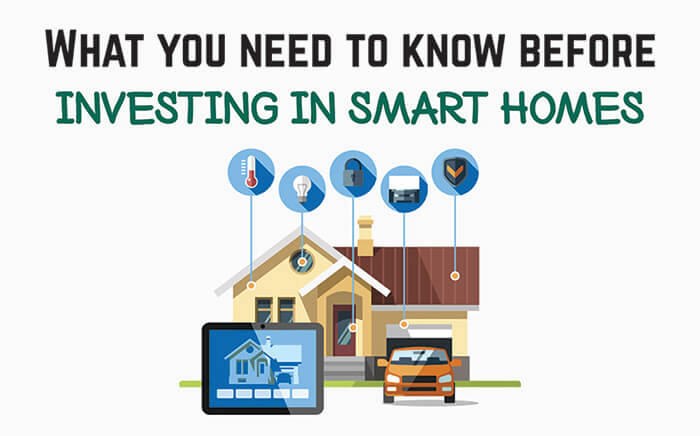What you need to know before investing in smart homes
 13-Apr-2022
13-Apr-2022Smart houses, which were formerly considered a futuristic phrase, are now extremely widespread in India's real estate industry. A few residential projects now provide amenities such as the ability to control all appliances with a single remote, utilize smart plugs to set timers for water geysers, and control lights via a smartphone appHowever, buyers and investors are frequently misled when it comes to smart homes and home automation owing to a lack of knowledge and comprehension. Home purchasers should understand the variables that contribute to their home being a smart home, as well as whether it is acceptable to pay a premium for features that they may or may not utilize.
WHAT EXACTLY IS A SMART HOME?
A smart house is one that is equipped with internet-connected gadgets that allow for remote administration and monitoring of appliances and systems such as lighting and heating. Smart homes, also known as home automation, provide homeowners with a sense of security, comfort, energy efficiency, and convenience by enabling them to manage the smart gadgets installed in their homes using a smart home app or other networked devices. Smart home automation systems, which are part of the Internet of Things (IoT), typically communicate consumer usage data among themselves to function together and automate operations depending on the homeowner’s preferences.
WHAT IS THE PROCESS OF SMART HOME AUTOMATION?
A smart home's heart is made up of connected appliances. Devices are linked to the Wi-Fi network, making them easy to operate. All these gadgets have software that records the user's preferences and tracks behavior. For example, a speaker that learns what kind of music you prefer, a smart mattress that adjusts to your back, or smart mirrors that detect health issues. problems, and sensors in toilets that can detect potential health problems by scanning waste before flushing can all be used to detect health problems.
Read Article:- Beginner’s Guide: How to Get Secured Your Home
Lighting, home security, home theatres, entertainment, and temperature adjustment are some of the main products that employ home automation.
HOME AUTOMATION'S ADVANTAGES AND DISADVANTAGES
Pros | Cons |
Smart homes and home automation give owners peace of mind by allowing them to manage their houses from afar. | Home automation may be difficult to operate, especially for those who are not technologically skilled. |
User preferences and habits may be accommodated in smart homes. | To be effective, home automation devices and appliances must be interoperable to be successful, independent of brand or manufacturer. There is currently no such market standard. |
Smart houses are also more energy-efficient. For example, your garden can be watered when you get home from work, and your house can be cooled when you go home from work. | Data security and privacy are significant problems. If hackers get access to your smart device, they will be able to access your personal information more easily or make your home more vulnerable to burglary. |
INDIA'S SMART HOME AUTOMATION FUTURE
The Indian smart home industry is estimated to reach USD six billion by 2022, according to Statista. This figure is estimated to reach USD 53.4 billion globally by 2022. Several appliance makers have released their variety of smart gadgets in the Indian market to capitalize on this demand. Panasonic, for example, debuted a line of smart appliances for the Indian market in February. The Coronavirus pandemic, on the other hand, is anticipated to impede the market's development.
- In India, smart home automation is available.
- If you want to engage in smart home projects, these are some of the benefits you may expect from your digitized house:
- Bathroom and toilet smart showers, geysers, and switches that can analyze urine and stool samples to monitor the user's health.
- Smart air conditioners (ACs), curtains, outlets, ceiling fans, and smart lockers are all available in bedrooms. In this case, your air conditioner and fan may work together to keep the temperature at a comfortable level for sleeping.
- Smart sensors for above tanks on rooftops that can give information on water levels, etc.
- Smart refrigerators, washing machines, toasters, soap dispensers, smoke detectors, and so on. Exhausts can start operating as soon as they detect gases in the kitchen.
· A front door with an internet-connected camera, we’re ringing the doorbell shows who is at the door on a smartphone or video screen.
· The drawing room will have smart TVs, tube lights, lamps, air purifiers, and speakers outfitted with IoT sensors that can be turned on and off via voice commands, as well as sensors that detect people's presence.
“We provide the best rental smart flats in Noida. We have provided the best rental smart flats in the top society for Noida & NCR.”
Related Article: Don’t Miss This Magic of Art in Your House



